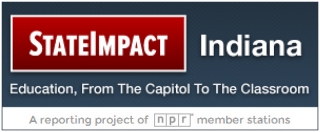Indiana appears ready to ditch the company that creates ISTEP after years of testing problems, but the cost of delivering Indiana’s state tests could go way up if it does.
British-owned Pearson, another giant testing company, won the state’s bid for a $38 million two-year contract to give the ISTEP test starting next spring over CTB-McGraw Hill, according to awards released today by the Indiana Department of Administration. California-based CTB-McGraw Hill has created ISTEP since the test’s inception in 2009. The company had a four-year, $95 million contract to create ISTEP that expired last year.
But state lawmakers are already casting doubts on whether they will approve the big spike in spending the contracts would require. So it’s not yet a done deal.
Awards to five other companies would push the price tag for Indiana’s testing system to $133.8 million for the next two years. CTB-McGraw Hill, which has been under fire for repeated testing problems over the past four years, was awarded $68 million to continue creating practice tests school districts use to prepare for state exams.
State Superintendent Glenda Ritz slammed the cost of the bids in a statement, which she said her department did not control.
“When I ran for this office, I ran on a platform that included less testing for our students,” Ritz said in a statement. “However, Indiana’s procurement process is modeled to comply with state and federal mandates that require a continuation of assessments that we have been administering to our students. The Department of Education learned of the awards and the astronomical costs of the assessments after this process had been completed.”
Shelley Triol, a spokeswoman for the department of administration, said her department monitors and carries out the contract proposal process on behalf of the education department and state board of education, but it isn’t involved in budget negotiations. The contracts are not yet final, she said, and budget issues have to be hashed out between the test companies and the department of education.
“For (requests for proposal) conducted or administered by IDOA on behalf of other agencies, IDOA has no part in the budgetary process,” Triol said in an email. “All budgetary issues are dealt with directly by the agency that will ultimately enter into the contract(s) that may result from the (proposal) process.”
Lawmakers, including state Sen. Luke Kenley, R-Noblesville, have been asking if Indiana should scrap ISTEP altogether in favor of a national “off-the-shelf” test like one from the Northwest Evaluation Association or a well-known exam like the Iowa Test of Basic Skills. Senate Bill 566, which Kenley authored, would do just that. The bill passed the Senate 46-3 last month and is expected to be considered by the House soon.
The current state budget proposal, passed last month by the House, does not include the extra money needed to pay for the contracts that were awarded. It allocates the same amount of money for testing as the state is spending now. The Senate began to debate the budget this week.
Kenley, who heads the budget-making Senate Appropriations Committee, said he thinks this creates the perfect opportunity for Ritz, the education department, lawmakers and the Indiana State Board of Education to continue discussions about his bill and creating a more streamlined, cheaper test that’s better for students and teachers.
“I think that getting the results of the (requests for proposals) and looking at the price tags is a helpful step in motivating everybody … to try to sit down and work on this thing, to get a resolution out that everybody gets comfortable with what we think will be beneficial for the students and for the teachers in the state,” Kenley said.
The education department, he said, is scheduled to present its budget proposal to the Senate Appropriations Committee on March 19. If the cost for testing remains as high as it is, Kenley said he’s not inclined to move the department’s proposal forward. The State Budget Committee, which will meet separately later on this year, must also review the test contracts.
That could throw the state’s entire plan to convert to a new state exam next year off course and raise several hard questions about whether a cheaper test could still meet all the requirements of state and federal law that the bidding companies were asked to meet.
Ritz was not available for interviews, but in her statement she seemed to endorse the idea that cost-saving alternatives should be explored.
“I strongly believe that Indiana needs a streamlined system of assessments that come at a reasonable cost to taxpayers,” she said in the statement. “I look forward to working with Indiana’s policymakers toward that outcome.”
Last month, news of a potentially 12-hour long ISTEP test sent policymakers into a panic. Part of the reason the test was projected to be so lengthy was because the department needed to add questions that did not count this year but that were being tried out for the 2015-16 test.
After a week of heated back-and-forth between Ritz’s department and Gov. Mike Pence’s office, a deal was struck to fast-track a bill that shortened the test by three hours.
Indiana State Board of Education member Sarah O’Brien said in a statement the board also wants more discussion about what the future state testing system should look like.
“The State Board of Education will take a very close look in the coming months at the proposed testing contracts in terms of overall scope and cost,” the statement said. “Hoosier taxpayers and parents can be assured the Board will not authorize any assessment that results in excessive testing time for our children or spends more tax dollars than is necessary to meet state and federal education requirements.”
CTB-McGraw Hill spokesman Brian Belardi said the company declined to comment. A representative from Pearson did not immediately respond to a request for comment.
Since 2011 CTB-McGraw Hill has had repeated problems with ISTEP.
The biggest incident came in April of 2013, about 78,000 Indiana students taking ISTEP experienced interruptions over the course of several days, or about 16 percent of all test takers online. It was the third consecutive year that online ISTEP had such troubles. In 2011, about 10,000 students had problem and in 2012, it was 9,000 students with online trouble.
Last August CTB-McGraw Hill reached a $3 million settlement with the state over problems on the 2013 exam. The company has had similar problems in other states including Oklahoma, which canceled its contract last July.
Here is a complete list of companies that were awarded potential two-year contracts to create test for Indiana:
- Pearson would create ISTEP for just over $38 million and IREAD-3, Indiana’s third-grade reading test, for almost $7 million.
- Questar Assessment would create the high school end-of-course exams for about $7.5 million and the alternate assessment for students with special needs for about $5 million.
- College Board, which writes the SAT and Advanced Placement tests, would create a graduation exam for $10.7 million and an exam that would determine whether students are ready for college or jobs for $624,381.
- Amplify, a New York City-based company, would write practice English tests for Kindergarten through second grade for a little more than $3 million.
- Strategic Measurement and Evaluation, an Indiana-based company affiliated with Questar, would create practice math tests for Kindergarteners through second-graders for about $900,000.
- McGraw-Hill would create practice tests in science, for kindergarten to second grade, for about $7 million; practice tests in social studies, for kindergarten to second grade, for about $7 million; practice English tests, grades 3 to 10, for almost $13 million; practice math tests, grades 3 to 10, for a little more than $11 million; practice science tests, grades 3 to 10, for a little more than $11 million; and practice social studies tests, grades 3 to 10, for a little more than $11 million.
Scott Elliott and Shaina Cavazos contributed to this report.
Chalkbeat Indiana is a nonprofit news site covering educational change in public schools.
 DONATE
DONATE









 Support WFYI. We can't do it without you.
Support WFYI. We can't do it without you.